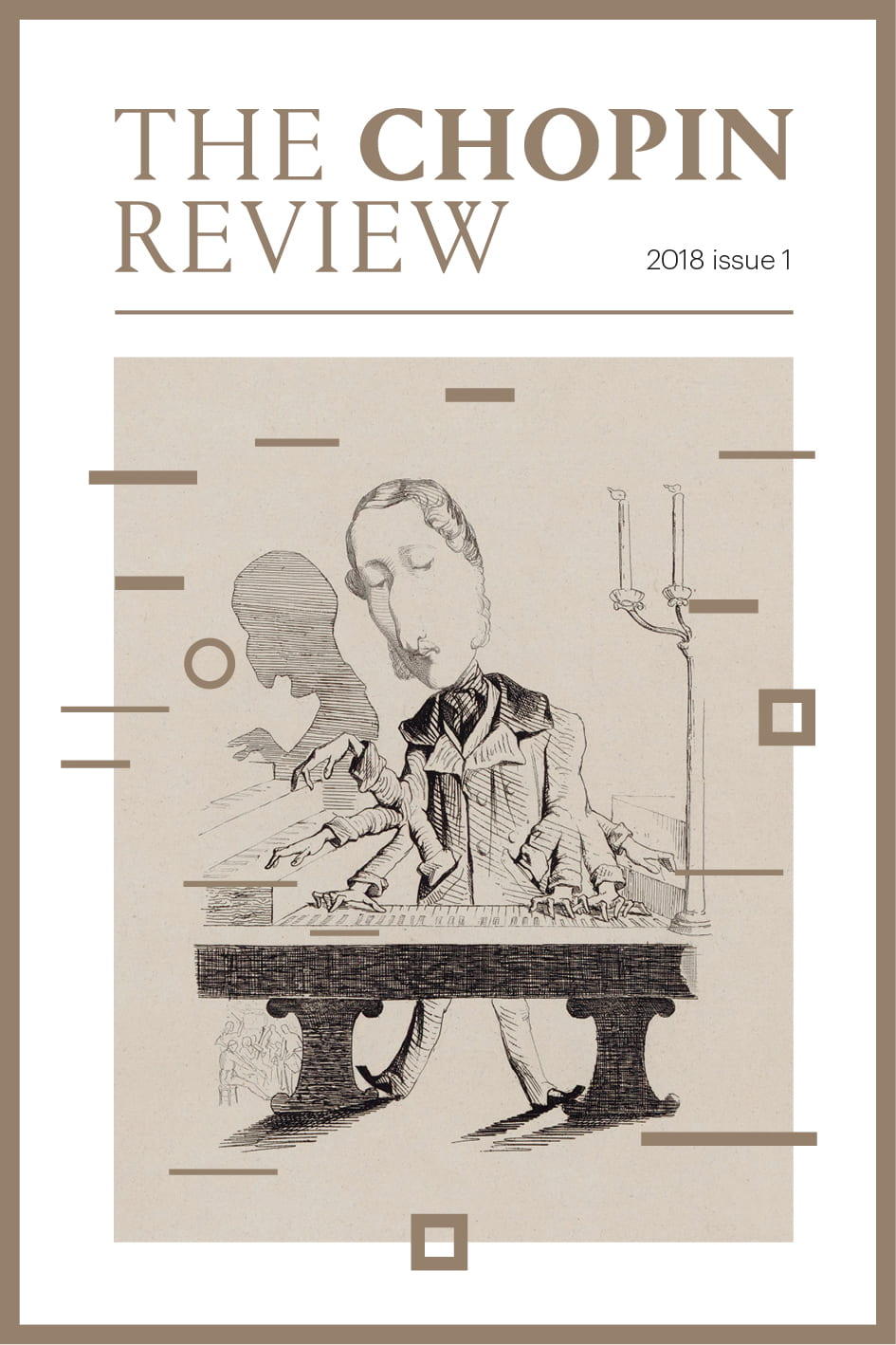Gifts gathered in Poland
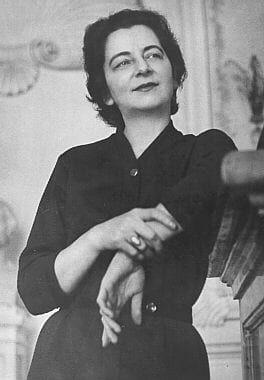 After another sojourn in Poland during late June and July, and visits with all kinds of good friends there, PMC once again was on the receiving end of many wonderful gifts to our library. Starting the list chronologically is a newly issued crime novel, Sidła [Snares], penned by Grażyna Bacewicz, better known to the entire world as an outstanding virtuoso violinist and a prolific composer. A notable polymath, Bacewicz was also a major literary talent, shining in her semi-autobiographical novel, Znak szczególny [Birthmark], first published shortly after Bacewicz’s death in 1969. This fine literary discovery—and a very entertaining read—is accompanied by a CD audiobook featuring voice actor, Anna Dereszowska. It was presented to the PMC by Dr. Daniel Cichy, PWM’s Director and Editor-in-Chief after a meeting in Kraków in late June.
After another sojourn in Poland during late June and July, and visits with all kinds of good friends there, PMC once again was on the receiving end of many wonderful gifts to our library. Starting the list chronologically is a newly issued crime novel, Sidła [Snares], penned by Grażyna Bacewicz, better known to the entire world as an outstanding virtuoso violinist and a prolific composer. A notable polymath, Bacewicz was also a major literary talent, shining in her semi-autobiographical novel, Znak szczególny [Birthmark], first published shortly after Bacewicz’s death in 1969. This fine literary discovery—and a very entertaining read—is accompanied by a CD audiobook featuring voice actor, Anna Dereszowska. It was presented to the PMC by Dr. Daniel Cichy, PWM’s Director and Editor-in-Chief after a meeting in Kraków in late June.
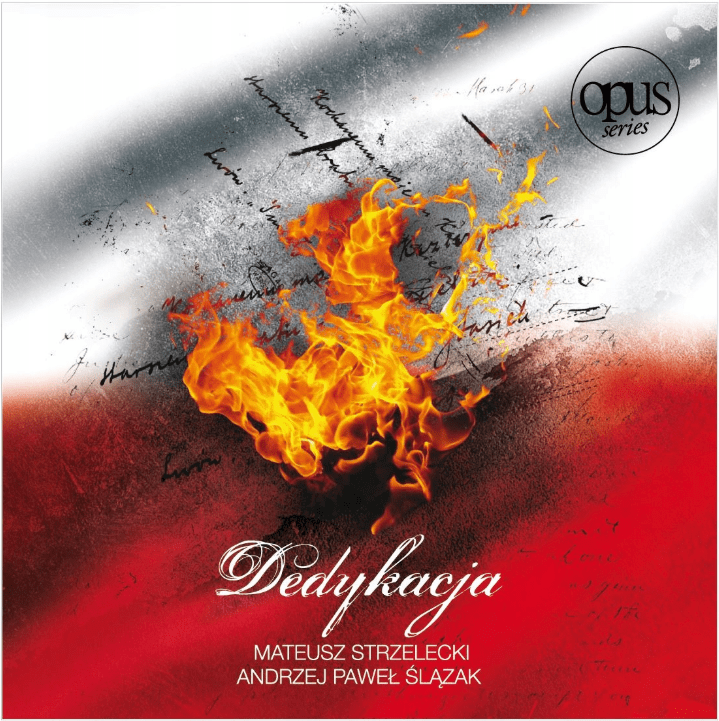 A young and talented violinist, Mateusz Strzelecki was recently awarded Fulbright Scholarship to travel and study in New York City. Mr. Strzelecki attended a concert of the Cultural Exchange Program at the Pulaski Palace in Warka on July 11 and presented the PMC with his CD entitled “Dedication”, featuring little-known works for violin and piano by Józef Koffler, Roman Padlewski, Karol Rathaus, Władysław Szpilman and Aleksander Tansman. Pianist Andrzej Paweł Ślązak ably partners Strzelecki on this excellent Opus Series CD release.
A young and talented violinist, Mateusz Strzelecki was recently awarded Fulbright Scholarship to travel and study in New York City. Mr. Strzelecki attended a concert of the Cultural Exchange Program at the Pulaski Palace in Warka on July 11 and presented the PMC with his CD entitled “Dedication”, featuring little-known works for violin and piano by Józef Koffler, Roman Padlewski, Karol Rathaus, Władysław Szpilman and Aleksander Tansman. Pianist Andrzej Paweł Ślązak ably partners Strzelecki on this excellent Opus Series CD release.
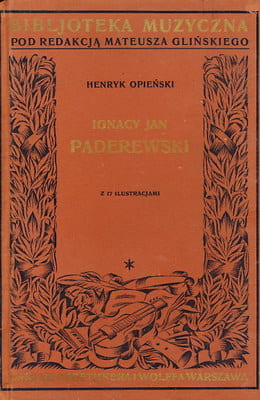 Our friend in Toruń, Krystyna Borkowska, continues to search for Paderewski-related rarities and donate them to us. About six months ago, we received from her a little-known book quoting Paderewski’s thoughts on Polish diaspora and Poland, published in Paris in 1992. This time around, whilst visiting Toruń in July, Krystyna surprised the PMC with a beautifully restored copy of Henryk Opieński’s Ignacy Jan Paderewski, a 1928 biography published in Warsaw by Gebethner and Wolff. Opieński was a very close friend and neighbor of Paderewski in Switzerland, and his book contains many fascinating insights on a number of Paderewski’s compositions and on his inimitable personality.
Our friend in Toruń, Krystyna Borkowska, continues to search for Paderewski-related rarities and donate them to us. About six months ago, we received from her a little-known book quoting Paderewski’s thoughts on Polish diaspora and Poland, published in Paris in 1992. This time around, whilst visiting Toruń in July, Krystyna surprised the PMC with a beautifully restored copy of Henryk Opieński’s Ignacy Jan Paderewski, a 1928 biography published in Warsaw by Gebethner and Wolff. Opieński was a very close friend and neighbor of Paderewski in Switzerland, and his book contains many fascinating insights on a number of Paderewski’s compositions and on his inimitable personality.
Following a visit at the Warka Palace just south of Warsaw on the occasion of a concert given by two students from California participating in the Paderewski Festival Youth Cultural Exchange program on July 11, the Museum’s director, Iwona Stefaniak presented the PMC with several wonderful books on Kazimierz Pułaski. Known in the U.S. as “father or the American cavalry,” Pulaski fought during the Revolutionary War and died on the battlefield in Savannah, Georgia, in 1779 at the age of 35. His family seat in Warka is not only a museum of Polish-American friendship but also has some links to Paderewski. A historic Bösendorfer piano that Paderewski once played is proudly displayed in the main salon of the palace, framed by twin portraits of Paderewski and his wife, Helena, that were once displayed in Paderewski’s Swiss residence.
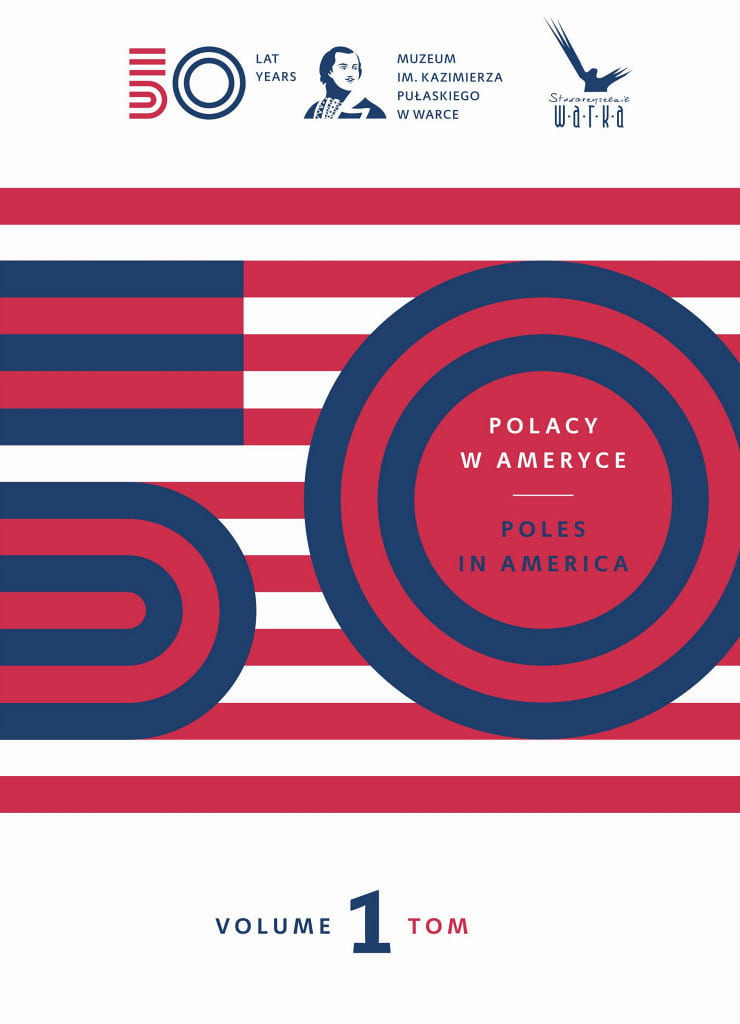 Among dir. Stefaniak’s gifts is a very interesting book, Casimir Pulaski, by Jan Stanisław Kopaczyński. Since it is in English, it’ll be very useful for local readers and researchers still unfamiliar with the fascinating life story of this hero of American Revolution. Another book, Kazimierz Pułaski i jego czasy w historii, literaturze, kulturze—w 270 rocznicę urodzin [Casimir Pulaski, his times in history, literature and culture—on the 270th anniversary of his birth] features several articles by contemporary researchers and also comes with a CD audio version. Still another item—also published by the Warka Museum—is the first volume of Poles in America, edited by Maciej Kordas, Karol Kucharski and Iwona Stefaniak. This bilingual publication is a compilation of research papers presented at the Polish-American conference celebrating the 50th anniversary of the Warka Museum in 2017. In addition to these volumes, we also received two richly illustrated albums on the history of the town of Warka and on country manors in the area, as well as brochures on First Poles in America, a guide to the Warka Palace and catalogues of several recent exhibits featured at the Pulaski residence.
Among dir. Stefaniak’s gifts is a very interesting book, Casimir Pulaski, by Jan Stanisław Kopaczyński. Since it is in English, it’ll be very useful for local readers and researchers still unfamiliar with the fascinating life story of this hero of American Revolution. Another book, Kazimierz Pułaski i jego czasy w historii, literaturze, kulturze—w 270 rocznicę urodzin [Casimir Pulaski, his times in history, literature and culture—on the 270th anniversary of his birth] features several articles by contemporary researchers and also comes with a CD audio version. Still another item—also published by the Warka Museum—is the first volume of Poles in America, edited by Maciej Kordas, Karol Kucharski and Iwona Stefaniak. This bilingual publication is a compilation of research papers presented at the Polish-American conference celebrating the 50th anniversary of the Warka Museum in 2017. In addition to these volumes, we also received two richly illustrated albums on the history of the town of Warka and on country manors in the area, as well as brochures on First Poles in America, a guide to the Warka Palace and catalogues of several recent exhibits featured at the Pulaski residence.
Gifts sent to the PMC
Another new friendship was initiated last winter when Ewa Bogula, Senior Specialist for Research and Publishing at the National Chopin Institute (NIFC) in Warsaw, was visiting Los Angeles. On a rather short notice, we were able to invite her to PMC and research materials from our Zygmunt and Luiza Stojowski Collection. Fast forward to July when a huge and heavy package arrived at our door. Besides a lovely personal note to the PMC staff, Ms. Bogula sent us several fascinating books and recordings, all of them recent publications of the National Chopin Institute.
All of the items donated by Ms. Bogula will be prized possessions in our library. The pride of place certainly goes to a superbly edited and beautifully laid out Ignacy Jan Paderewski. Listy do Ojca i Heleny Górskiej (1872-1924) [Ignacy Jan Paderewski. Letters to his Father and Helena Górska]. Following a gift of the original letters to Jagiellonian University’s Paderewski Institute of Musicology in Kraków made in 2001 by Anne Strakacz-Appleton, the foremost Polish authority on Paderewski, Dr. Małgorzata Perkowska-Waszek began to assemble and annotate this correspondence for publication. After Dr. Perkowska-Waszek’s death, the completion of the work fell on the able shoulders of Małgorzata Sułek and Justyna Szombara at the Institute of Musicology and then led to the publication by the National Chopin Institute. With copious facsimiles of Paderewski’s letters, photographs, color images showing first editions of Paderewski’s compositions, period postcards and other illustrations, this book sheds much new light on Paderewski’s youth and formative years as a composer and individual.
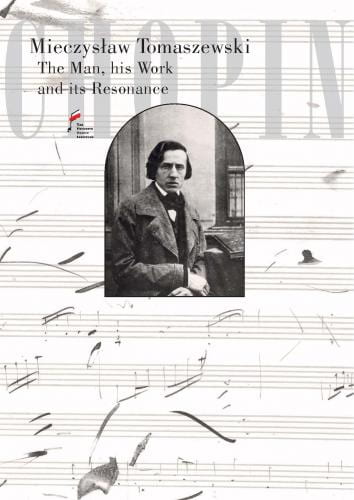 Another great addition to the PMC library is Mieczysław Tomaszewski’s magisterial work, Chopin—The Man, his Work and its Resonance. Originally presented as a PhD dissertation in the early 1980s and published only in an abridged version, this 2015 English edition by the National Chopin Institute was revised by the author in the mid-1990s. On the wide canvass of almost 1,000 pages, Tomaszewski—a former professor of Kraków Music Academy and a former director of PWM—presents Chopin in three extensive volumes. The first is about Chopin’s life and artistic career as pianist and composer. Volume II undertakes a thorough analysis of Chopin’s music, examining genres, forms, aesthetics and styles. Volume III focuses on the resonance of Chopin’s opus and its influence on composers and performers alike. A great undertaking like this certainly deserves a fitting translation and John Comber’s impeccable rendition of Tomaszewski’s prose into idiomatic English deserves much praise.
Another great addition to the PMC library is Mieczysław Tomaszewski’s magisterial work, Chopin—The Man, his Work and its Resonance. Originally presented as a PhD dissertation in the early 1980s and published only in an abridged version, this 2015 English edition by the National Chopin Institute was revised by the author in the mid-1990s. On the wide canvass of almost 1,000 pages, Tomaszewski—a former professor of Kraków Music Academy and a former director of PWM—presents Chopin in three extensive volumes. The first is about Chopin’s life and artistic career as pianist and composer. Volume II undertakes a thorough analysis of Chopin’s music, examining genres, forms, aesthetics and styles. Volume III focuses on the resonance of Chopin’s opus and its influence on composers and performers alike. A great undertaking like this certainly deserves a fitting translation and John Comber’s impeccable rendition of Tomaszewski’s prose into idiomatic English deserves much praise.
 Chopin’s Polish Letters, edited by Professor Jeffrey Kallberg, translated by David Frick, and published in 2016 by the National Chopin Institute, is yet another welcome addition to the PMC library. Almost 300 letters spanning the years 1816-1849 are quoted with extensive annotations, placing them in the context of Chopin’s family, friends, and other acquaintances. Previous English translations of Chopin’s letters published in the 1930s and early 1970s were to some extent incomplete or inaccurately conveyed from their originally and sometimes idiosyncratic Polish that Chopin loved to use. This definitive edition should be treasured by all interested in exploring every aspect of Chopin’s rich life and meteoric career.
Chopin’s Polish Letters, edited by Professor Jeffrey Kallberg, translated by David Frick, and published in 2016 by the National Chopin Institute, is yet another welcome addition to the PMC library. Almost 300 letters spanning the years 1816-1849 are quoted with extensive annotations, placing them in the context of Chopin’s family, friends, and other acquaintances. Previous English translations of Chopin’s letters published in the 1930s and early 1970s were to some extent incomplete or inaccurately conveyed from their originally and sometimes idiosyncratic Polish that Chopin loved to use. This definitive edition should be treasured by all interested in exploring every aspect of Chopin’s rich life and meteoric career.
 Continuing on the Chopin theme, The International Fryderyk Chopin Piano Competition in Photographs (1927-2005) is another great National Chopin Institute publication. This album of historical images includes all kinds of formal and informal portraits of contestants, juries, Chopin Competition posters, awards and medals, cartoons of participants and even philatelic curiosities. It is a virtuoso tour de force of memorabilia and a must-read/must-see for Chopin Competition aficionados all around the world.
Continuing on the Chopin theme, The International Fryderyk Chopin Piano Competition in Photographs (1927-2005) is another great National Chopin Institute publication. This album of historical images includes all kinds of formal and informal portraits of contestants, juries, Chopin Competition posters, awards and medals, cartoons of participants and even philatelic curiosities. It is a virtuoso tour de force of memorabilia and a must-read/must-see for Chopin Competition aficionados all around the world.
Edited by Kamila Stępień-Kutera, Between National Identity and a Community of Cultures is a collection of scholarly papers in English and French by a number of prominent musicologists, including Zofia Chechlińska, Agnieszka Chwilek, Jean-Jacques Eigeldinger, Harald Herresthall, Maciej Janicki, Marek Krajewski and Irena Poniatowska. The subjects treated by these scholars range from Chopin and Tellefsen to Polish national music, Norwegian identity in music, literary presence in music of various 19th century composers, and music’s role in articulating national identity in the age of globalization.
The Chopin Review is a new National Chopin Institute publication aiming at supporting, coordinating and disseminating academic research into Chopin and his music. The first issue (2018) of The Chopin Review contains the proceedings of a conference held immediately after the 2015 Chopin Competition in Warsaw. It includes articles on a variety of topics by Anna Chęćka, Wojciech Kocyan, Lisa McCormick and Richard Parncutt as well as a summary of a panel discussion led by John Allison. Four book reviews that follow balance this newly launched periodical.
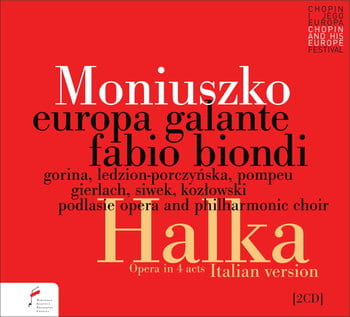 Finally, Ewa Bogula’s generous gift to us also included six CD recordings. The first three discs are from the annual Chopin and His Europe Festival series taking place in Warsaw. The most interesting and unique among these CD is certainly the first recording of Stanisław Moniuszko’s Italian version of his opera, Halka, performed by the Europa Galante ensemble of period instruments under the baton of Fabio Biondi. Also from the same festival come two discs featuring pianists Nelson Goerner (NIFCCD 061) and Dang Thai Son (NIFCCD 051). Accompanied by Jacek Kaspszyk and Polish National Radio Symphony Orchestra, Goerner is heard in Ignacy Jan Paderewski’s Piano Concerto in A minor and Giuseppe Martucci’s Piano Concerto No. 2 in B-flat minor. Dang Thai Son’s CD features a number of solo works by Paderewski as well his Piano Concerto, with Vladimir Ashkenazy leading the Philharmonia Orchestra.
Finally, Ewa Bogula’s generous gift to us also included six CD recordings. The first three discs are from the annual Chopin and His Europe Festival series taking place in Warsaw. The most interesting and unique among these CD is certainly the first recording of Stanisław Moniuszko’s Italian version of his opera, Halka, performed by the Europa Galante ensemble of period instruments under the baton of Fabio Biondi. Also from the same festival come two discs featuring pianists Nelson Goerner (NIFCCD 061) and Dang Thai Son (NIFCCD 051). Accompanied by Jacek Kaspszyk and Polish National Radio Symphony Orchestra, Goerner is heard in Ignacy Jan Paderewski’s Piano Concerto in A minor and Giuseppe Martucci’s Piano Concerto No. 2 in B-flat minor. Dang Thai Son’s CD features a number of solo works by Paderewski as well his Piano Concerto, with Vladimir Ashkenazy leading the Philharmonia Orchestra.
NIFC also presents a recital of works by lesser known Romantic Polish composers and pianists (including Dobrzyński, Elsner, Friedman, Mikuli, Krogulski, Kurpiński, Ogiński, Szymanowska and Załuski) performed by pianist Tobias Koch on period Erard and Pleyel pianos (NIFCCD 104). For comparison, two of Chopin’s Mazurkas (Op. 7 no. 4a and Op. 68 no. 4) are also included in the program. Together with Sinfonia Varsovia, pianist and conductor Howard Shelley performs a CD of rarely heard repertoire of music from Chopin’s time, including Józef Krogulski’s 1830 Piano Concerto No. 1 and Franciszek Lessel’s Adagio et rondeau à la polonaise (NIFCCD 109). And finally Kevin Kenner’s 2017 recording of Paderewski’s grand Sonata in E-flat minor Op. 22 as well as selections of short piano works from Op. 14 and Op. 16 are an attractive and well-executed presentation (NIFCCD 057).
~ ~ ~
Thanks again to Ewa Bogula, Dr. Daniel Cichy, Krystyna Borkowska, Iwona Stefaniak and Mateusz Strzelecki! Dziękujemy to all of our friends and donors.
